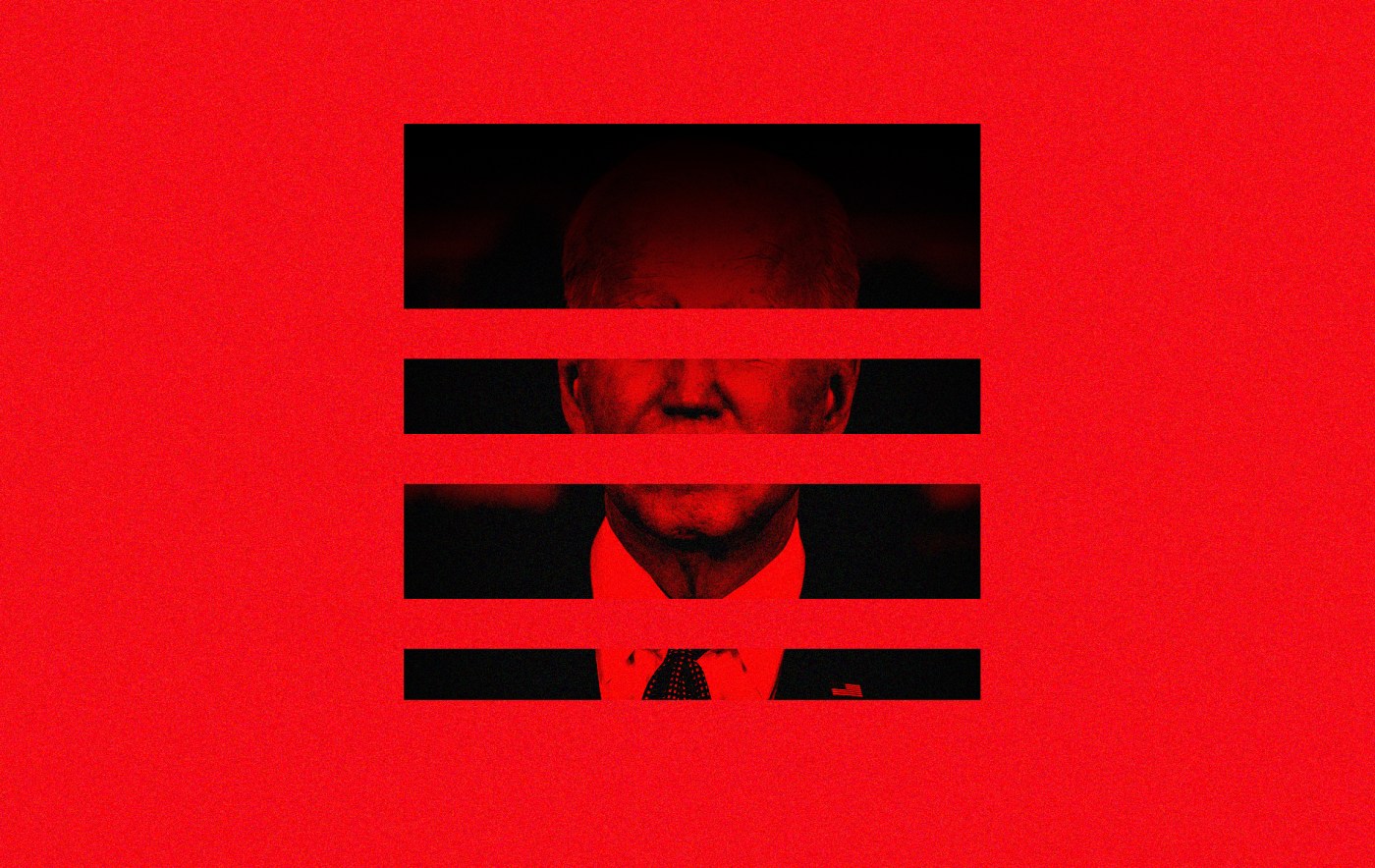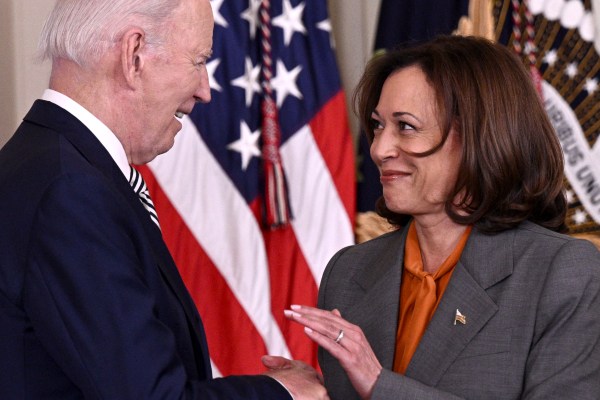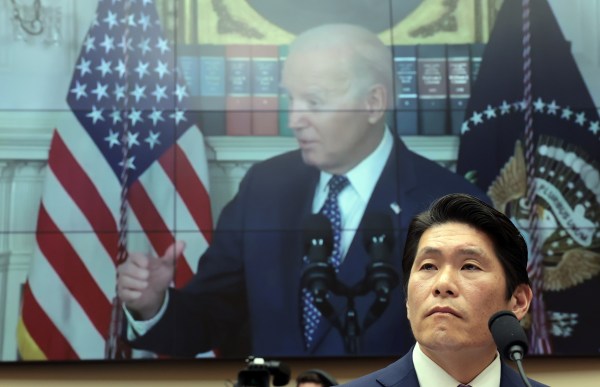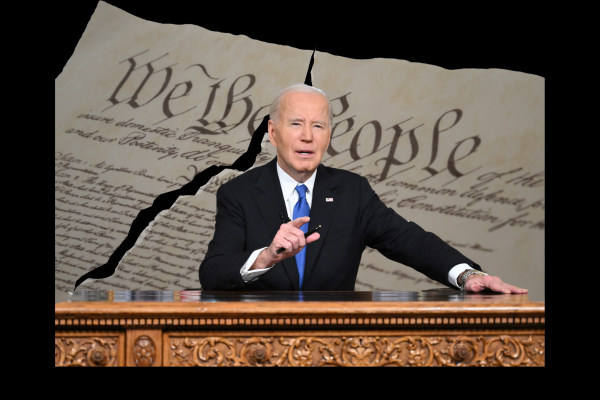In an interview last week, Joe Biden’s national security adviser claimed he was stunned to see his boss’ disastrous debate performance in June 2024. “What happened in that debate was a shock to me,” Jake Sullivan said. “I think it was a shock to everybody.”
Seeing the president incapable of completing sentences and lost in a tangle of words may have been shocking for someone who routinely avoids the news. But it wasn’t surprising to anyone paying even casual attention to Biden over the past several years. And it certainly wasn’t a surprise to Jake Sullivan.
On December 9, 2022, more than 18 months before the debate that would end his political career, Biden forgot the names of two White House senior officials. One of them was Jake Sullivan.
Standing in the Outer Oval with National Security Adviser Jake Sullivan and Kate Bedingfield, his communications director, he couldn’t come up with either of their names, according to one witness. “Steve ...” he said to Sullivan. “Steve ...” he continued, obviously struggling to recall Jake’s name. He turned to Bedingfield. “Press,” he called her, as he beckoned them into the Oval Office.
This incident comes to us in a new book from Jake Tapper and Alex Thompson that has had Washington buzzing over the past week, titled Original Sin: President Biden’s Decline, Its Cover-Up, and His Disastrous Choice to Run Again. It’s one new anecdote among dozens that, taken together, provide an authoritative, detailed, and devastating account of one of the most consequential scandals in modern American history: The president of the United States was unfit to perform the duties of the job, and those close to him went to extraordinary lengths to hide his deterioration.
“Joe Biden knows my name,” Sullivan insisted last week, saying he doesn’t recall the episode described in the book. But for Sullivan to have truly been surprised by Biden’s confusion and incoherence at the presidential debate would have required his ignorance of dozens of similar incidents, many of them public, as well as sweeping changes to the way the White House staff and the Biden campaign handled the president to hide his decline.*
Beginning early in his presidency, top White House advisers and Biden family members devised plans to accommodate his decline. As the president’s limitations became clearer, according to Tapper and Thompson, White House speechwriters “were slowly adapting to Biden’s diminished capabilities.” The communications team dramatically limited his public appearances and media interviews. Internal conversations with staff and members of his Cabinet were scripted for Biden—including discussions that took place beyond the eyes of the White House press corps.
Biden’s staff imposed tight limits on his daily schedule, often restricting his meetings and activities to midday hours when Biden was thought to be at his best. As his gait became more unsteady, and after some embarrassing falls, his team sought to shorten distances he’d walk and recommended changes to his footwear that would provide the president with additional stability. Biden’s fundraisers were reprogrammed with strict limits on the number of questions Biden took from his audiences and little time for spontaneous interaction with those funding his reelection.
All the while, top Biden advisers insisted to reporters that the president was fine—as sharp as ever, in command of facts, energetic in meetings, perfectly capable not only of running for reelection but serving another four years. The public gaffes were anomalous, they insisted, indicative of nothing more than the occasional brain fart, and we all have those, right? His literal missteps? Okay, he’s getting a little older and he has arthritis in his feet, they would concede, but none of this has any effect on his ability to do the job. If a reporter was imprudent enough to ask about Biden’s increasing number of blunders, they’d be quietly threatened with revoked access to White House sources and sometimes attacked in public.
The main contribution Original Sin makes to the public debate about Biden is providing new, authoritative reporting on the president’s decline and the concerted behind-the-scenes effort by top Democrats to conceal it. But for the average reader, the most powerful part of the book comes in a six-page section called “Special Counsel Robert Hur, Part Two,” when the authors retell a story already in the public domain.
The battle over the report by special counsel Robert Hur, who investigated Biden’s alleged mishandling of classified information, was widely covered at the time. Hur and his team listened to recordings of conversations Biden had with Mark Zwonitzer, a writer who helped him with the book he wrote after serving as vice president. The recordings were important for two reasons: Biden discussed his possession of classified materials and seemed to have shared them with his co-writer, and the former vice president, in the words of Tapper and Thompson, “sounded very old and quite diminished. In 2017.”
In the fall of 2023, Hur interviewed Biden twice for a total of more than five hours. The special counsel concluded that, while the president may have committed crimes by knowingly keeping and discussing classified information after his service as vice president, he shouldn’t be prosecuted—in part because a jury would likely find him a “sympathetic, well-meaning, elderly man with a poor memory.” Top Democrats and sympathetic media personalities insisted that Hur was exaggerating the president’s mental deterioration and savaged him as a right-wing hack motivated by politics. For several days, they subjected Hur to an unceasing stream of withering attacks on his character and motives. But a closer look at the interviews (and the actual audio, released publicly by Axios over the weekend) made clear that if anything, Hur was understating Biden’s struggles.
The special counsel’s questioning of Biden was gentle, not adversarial. Tapper and Thompson republish excerpts of the transcripts nearly verbatim, and the result is an extraordinarily uncomfortable read. There is a relentlessness to Biden’s confusion—“I’m, at this stage, in 2009, am I still vice president?” Biden wonders aloud—that leaves the reader hoping for someone to intervene. And at one point, in the middle of a long Biden digression on losing his son, Beau, to cancer, Hur does just that. “Sir, I’m wondering if this is a good time to take a break briefly,” Hur said. “Would that be—” But Biden kept going.
No one who had read these transcripts—let alone worked closely with the president daily on crucial matters of national security, as Jake Sullivan had—should have been surprised by Biden’s debate performance a few months later.
With so much public evidence of Biden’s decline and so many Democrats with a window into the president’s deterioration, why did the establishment media pay so little attention to the story?
It’s not true, as some professional right-wing outrage merchants have claimed, that the establishment media failed to report on Biden’s mental acuity altogether. But major investigations were rare enough that we can tally them on one hand and have digits left over—and it could be argued that we can count them with the same finger many Americans extend in our direction when asked about their views of contemporary American journalism. On June 5, 2024, the Wall Street Journal published a piece by Annie Linskey and Siobhan Hughes headlined, “Behind Closed Doors, Biden Shows Signs of Slipping.” The story relied on interviews with “more than 45 people over several months” and reported that people who have worked with Biden, “including Democrats and some who have known him back to his time as vice president, described a president who appears slower now, someone who has both good moments and bad ones.”
Anyone who follows politics understands when the Washington press corps is obsessed with a story. Take, for example, the New York Times’ coverage of the Al Qa’qaa weapons depot in the week leading up to the 2004 election. The Times reported on October 25 that the U.S. military had allowed 380 tons of high explosives held at Al Qa’qaa to go missing, demonstrating the incompetence of the Bush administration’s oversight of Iraq. The Times alone ran about two dozen stories about Al Qa’qaa over the next week, and there were 823 mentions of Al Qa’qaa in English-language media over the same period. The coverage of Biden’s deterioration never reached that fever pitch—until the debate. Prior to that night, the approach to covering Biden’s age and cognitive fitness was often timid and apologetic—more “let’s do this story we don’t want to do,” than “let’s go all-in on this big scandal.”
There are several reasons for this: general ideological bias, fear of helping Donald Trump, worries about access to the White House, and more. A Republican with such extensive public evidence of cognitive decline would have undoubtedly been subject to relentless questioning by the country’s leading political journalists. The failure to include cognitive test results on his medical disclosure forms would have been taken as prima facie evidence of a cover-up. White House press briefings would have featured hostile exchanges with a press secretary denying observable reality, and background sources would have been badgered to acknowledge public concern reflected in polling.
Even without this everyday coverage, voters consistently told pollsters they had concerns about Biden’s age and his mental fitness. In the spring of 2023, only 32 percent of voters surveyed in a Washington Post/ABC News poll said they believed Biden had the “mental sharpness it takes to serve effectively as president.” An NBC News poll taken in June of that same year found that 55 percent of voters had “major” concerns about Biden having the physical and mental health to serve as president.
The media failure went beyond sins of omission to sins of commission, too. Perceptions of Biden’s struggles were explained away in reported pieces as the result of misleading “cheap fakes” or downplayed as problems anyone might have. Biden partisans denigrated anyone who raised concerns. The attack on Robert Hur from Jennifer Rubin, then a Washington Post columnist, was typical. “But it was Hur’s gratuitous smear about Biden’s age and memory—most egregiously, his far-fetched allegation that Biden could not recall the date of his son Beau’s death—that transformed a snide report into a political screed,” Rubin wrote. (In fact, Hur’s claim about Biden’s memory was not at all gratuitous, his allegation that Biden didn’t recall the dates of Beau’s death was accurate, and his report was neither snide nor a political screed.) MSNBC’s Joe Scarborough did the same and later lashed out at anyone who might question Biden’s abilities. “Start your tape right now because I’m about to tell you the truth,” he said. “And ‘F’ you if you can’t handle the truth. This version of Biden, intellectually, analytically, is the best Biden ever.” Scarborough stood by those comments in an interview this week.
Few people who aren’t related to Joe Biden or on his payroll are making that case today.
In an appearance on The View two weeks ago, Biden was asked by Alyssa Farah Griffin about reporting on his diminished mental acuity. “Mr. President, since you left office, there have been a number of books that have come out—deeply sourced from Democratic sources—that claim in your final year, there was a dramatic decline in your cognitive abilities, in the final year of your presidency,” Griffin said. “What is your response to these allegations? And are these sources wrong?”
Biden began his response. “They are wrong,” he said. “There’s nothing to sustain that, number one. Number two, you know, think of what we were left with. We were left with a circumstance where we had a, ah, in insurrection where I started—we, that, not since the Civil War. We were in a circumstance where we were in a position where—well, I’ll—pandemic, because of the incompetence of the last outfit end up over a million people dying, a million people dying. And we’re also in a situation where we found ourselves, ah, unable to deal with, ah, a lot of just basic issues, which I won’t go into—interest of time. And so we went to work, and we got it done. And, you know, one of the things that, that—well, I talked too long.”
As Biden struggled, his wife, sitting by his side, jumped in to answer the question. “And Alyssa, one of the things I think is that the people who wrote those books were not in the White House with us,” Jill Biden said. “And they didn’t see how hard Joe worked—every single day. I mean, he’d get up, he’d put in a full day, and then at night”—the camera cut away to a shot of Joe Biden, his face frozen in the distant stare so familiar to families who have dealt with loved ones struggling with cognitive issues—“I’d be in bed reading my book and he was still the one on the phone, reading his briefings, working with staff. I mean, it was nonstop. The White House, being the president, is not like a job; it’s a lifestyle. It’s a life that you live. You live it 24 hours a day. That phone can ring at 11 o’clock at night or two in the morning. It’s constant. You never leave it. And Joe worked really hard. I think he was a great president. And if you look at things today, give me Joe Biden anytime.”
One can understand why Jill Biden would stand by her man and try to defend her husband’s legacy. But it’s precisely because the presidency is more than a job—because “it’s a life that you live … 24 hours a day”—that the cover-up in which she and others in Biden’s inner circle participated is such a disgrace. The recent news that the former president was diagnosed with aggressive prostate cancer only exacerbates how dire the situation truly was. Good days and bad days at the end of Grandpa’s life are heartbreaking. But good days and bad days at the end of an American presidency are dangerous—and the effort to conceal them is a scandal of the first order.
Correction, May 22, 2025: This article originally described the June 27, 2024, presidential debate as the only one of the cycle. It was the only one that Joe Biden participated in.







Please note that we at The Dispatch hold ourselves, our work, and our commenters to a higher standard than other places on the internet. We welcome comments that foster genuine debate or discussion—including comments critical of us or our work—but responses that include ad hominem attacks on fellow Dispatch members or are intended to stoke fear and anger may be moderated.
With your membership, you only have the ability to comment on The Morning Dispatch articles. Consider upgrading to join the conversation everywhere.